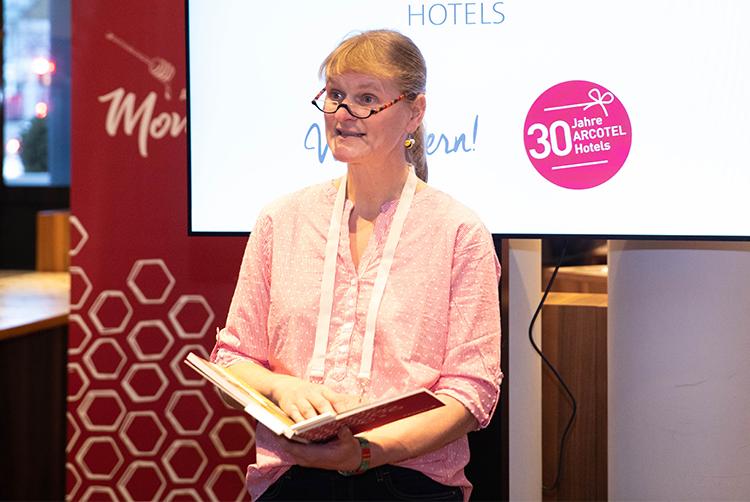Letter from a Bee to Mankind
LETTER FROM A BEE TO MANKIND ”I’M A HONEYBEE”
Allow me to introduce myself: I’m a honeybee, specifically, a Carniolan honeybee. My name? Not important. We bees feel like one giant organism in which individualism is of little significance. Kind of like the motto of the Three Musketeers: All for one and one for all!
I live in a hive together with 40,000 other bees. And we’re an exclusively female household. Our boss is also a she – you people call her a queen. She is our mother, and with “our” I mean of each and every one of us. After all, she doesn’t do anything else other than lay eggs. That’s okay, but it’s nothing for me. Or would you like to lay 2,000 eggs a day all summer long? Okay, so there are a few males around here. Those are the drones. But they’re relatively useless. Those guys can’t even find their own food, and they sleep a lot. They wake up around noon and fly off in search of a virgin queen to mate with. Sex is taboo in the hive. And anyway, there’s enough to do as is. We spend the first three days after hatching just cleaning our brood cells. Once our jelly glands develop, we become nurse bees and feed the larvae. That’s a fantastic job – the little ones are just so cute! When the wax glands mature, we become wax bees. Wax bees are the builders in charge of comb construction. After about 16 days, our venom reservoir fills, and we become guard bees. I am now 20 days old, my jelly gland has been transformed, and I can finally go out and gather nectar to make honey.
After 20 days in the hive, we finally get to go out and explore the world in all its splendour. For the first time, I saw the sun, the sky, the flowers – the view from up high is just amazing! But my first flight was like jumping in at the deep end. There was no training, no preparation. I desperately tagged along with an old forager so I wouldn’t get lost. She took me to a beautiful meadow where we gathered the sweet nectar from the flowers. All of a sudden, I was alone … but no matter! With my internal sense of direction – Thank you, sun! – I always find my way home. Back in the hive, I dutifully gave my nectar to a storage worker, who took the sweet stuff to the honey cells for further processing.
Meanwhile, I’ve become quite the professional. I can do it all and I do it well: look for flowers, gather nectar, avoid spider webs and birds. Sometimes that’s kind of scary, but mostly it’s fun. Really useful is our way of communicating: the waggle dance. Our scouts use this form of communication to tell us where to find the best flower patches. One day, I flew a bit too far out of my foraging area, something I nearly paid for with my life. If we fly more than three kilometres, we consume most of our nectar as fuel and come home with an empty tank. But I couldn’t help myself: I was magically attracted to that bright yellow field out there, so I dove in for a precision landing, stuck out my proboscis, and started sucking up the sweet nectar. In all my excitement, I didn’t hear the loud noise that was rapidly approaching. Suddenly it was dark and wet, there was a strange smell. I was pretty scared. As soon as I had dried off, I raced back home at full speed. Bees can fly at speeds up to 30 km/h! My reception at the hive was less than enthusiastic. First, I had to be cleaned, then I was debriefed.
Where I had been and so on. An older bee took notes. I was informed that I had got pesticide all over my fur and that the nectar was contaminated. The stuff that the farmer had sprayed on the plants leaves a residue in the honey. You can imagine what happens when you feed that to the larvae. Why do people do such a thing? They eat our honey too, don’t they?
The next day, I faced a new challenge: a field full of plants without nectar. I flew in all directions, but I found the same thing everywhere I looked. And I was so hungry! Then I noticed a few drops of something shiny twinkling in the axil of a leaf. I was just about to stick my snout in there when a loud STOP! DON’T DO IT! stopped me in my tracks. Another bee rudely shoved me from the leaf. Hey, you stupid jerk, I thought, what was that all about?
When we had landed on the ground, she asked me if I was mad. That stuff is toxic, she said, and while it wouldn’t kill me right away, it would sort of uninstall my sat-nav so I couldn’t find my way back to the hive. And that would mean a slow death. Whew! I sure got lucky there!
And now to the point: We bees aren’t doing well at all. The fields are getting bigger, habitats for insects and birds are dwindling. More and more plants are being cultivated strictly for biofuel production. But we bees need lots of different types of nectar-producing plants. Isn’t a varied diet important for people too? We all live in a cycle that no one should interrupt. Our work helps produce fruits and seeds. People need the fruits to live; the seeds are eaten by birds and are used to make oil. Meadows and grasses provide feed for livestock.
You can see where this is going. There’s a catastrophe barrelling our way. Personally, I will conveniently avoid this disaster through my premature demise, but what about your future? Who will pollinate the plants when we’re all gone? How will all your fruits and vegetables grow and flourish? We’re hard at work everywhere in the world pollinating over 80 percent of all agricultural crop – without pay!
Do you want to end up like the Chinese, who now must climb the trees themselves to pollinate the blossoms by hand because of the eradication of my kind? With us bees, we come full circle. When we’re gone, there will be no more pollination, and the circle is broken. A life without bees just doesn’t seem possible!
My appeal to mankind: Open your eyes and stop poisoning the world. Think where this story is going and how it will end. What about your children and grandchildren? Don’t you want to leave them a world that is worth living in, this world with its magnificent nature and all of its creatures? Anyway, that’s all I’ve got to say. I only have a few more days to live, and I want to spend those in the service of my hive and its survival. That may sound cold to you, but that’s life for us. After 35 days on this Earth, we honey bees are just plain exhausted. Greetings from a very concerned bee who has seen a lot – perhaps too much – of this world and is starting to worry. But I have hope that my appeal will be heard.



